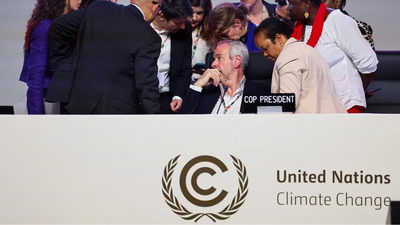GENEVA: The UN rights chief lamented Monday the “meagre results” at the COP30 climate summit, warning that the “fatal inaction” of leaders might one day be considered a crime against humanity.Nations sealed a modest agreement at the UN climate summit in the Brazilian Amazon on Saturday as many countries swallowed weaker terms on a fossil fuel phaseout to preserve unity.The agreement calls on countries to voluntarily “accelerate” their climate action, but only with an implicit nod to phasing out fossil fuels.In an address to the UN’s business and human rights forum in Geneva, UN rights chief Volker Turk warned that the “meagre results of COP30 in Belem” illustrated how “corporate power imbalances … play out in the climate emergency”.”The fossil fuel industry is generating massive profits while devastating some of the poorest communities and countries in the world,” he said. “There needs to be proper accountability for this injustice, and for all other harms related to climate chaos.”Turk highlighted a recent ruling by the International Court of Justice determining that “governments need to prevent significant harm to our climate, including by regulating businesses”. And the Inter-American Court of Human Rights had also recognised the right to a stable climate and called on countries to “enforce corporate due diligence and provide remedies for climate related harm”, he said.The UN High Commissioner for Human Rights told Monday’s gathering that he often wondered “how future generations will judge our leaders’ actions – and their fatal inaction – on the climate crisis in 50, 100 years from now”.”Could the inadequate response of today be considered ecocide or even a crime against humanity?”

UN slams 'meagre' COP results, 'fatal inaction' of leaders


